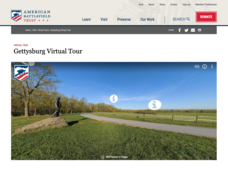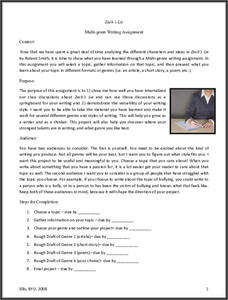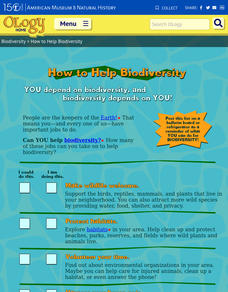National Wildlife Federation
Hot, Hotter, Hottest: Extreme Weather's Impact on Our Resources
How dry is it? It's so dry, the river only runs twice a week! Through an analysis of maps and discussions, pairs learn about droughts across the United States in the ninth of 12 lessons. They then read about, answer questions, analyze...
Curated OER
Arabia: Educator's Resource and Activity Guide
MacGillivray Freeman's film Arabia presents viewers with remarkable images and insights into this ancient and mysterious land. An educator's guide is designed to provided teachers with the materials they need to support a showing of the...
ReadMagazine
William Shakespeare
Is this an interactive resource I see before me? Fret not. Here's a resource filled with sound, and a bit of fury, sure to engage learners in a study of Shakespeare's Scottish play. User can view an interview with Shakespeare, examine...
American Battlefield Trust
Gettysburg Virtual Tour
Step into one of the most iconic battlefields of the American Civil War with an educational interactive resource. Young historians learn about key moments, locations, soldiers, and turning points in the battle with a clickable map and...
American Battle Monuments Commission
Flying Yanks: American Airmen in World War I
Their boots may not have been on the ground, but military airmen in World War I made a lasting impact on the global conflict. A thorough interactive resource takes learners through a timeline of events, campaigns, and battles with...
Novelinks
Zach’s Lie: Multi-Genre Writing Assignment
How do people solve problems in healthy ways? Writers explore a topic of interest in their multi-genre writing assignment exploring Zach's Lie. The final resource in a series of seven includes multiple scaffolds and organizers for...
University of California
The Civil War: Perspective
Confederate soldiers saw the Civil War much differently than their Union counterparts. Scholars analyze the perspective of the Civil War from the viewpoint of various key figures in the fourth installment of an eight-part series. By...
University of North Carolina
Argument
What elements make up a successful argument? A helpful resource describes aspects of an argument such as the claim, evidence, counterargument, and audience. Perfect as an individual assignment for a flipped lesson or collaborative work,...
Learning A-Z
Tips for Teaching: Word Recognition
Learning to read can be exhilarating for some pupils, but for others, it's difficult to get past the frustration of not knowing how to read a particular word. A tutoring resource provides several ways to guide class members into...
Free Library of Philadelphia
Resources for Ghost Boys
Jewell Parker Rhodes, the author of Ghost Boys, wanted to bring the historical legacy of Emmett Till and the current topic of racial prejudice into today's young readers' mindsets. Use a reading guide and set of discussion questions to...
Howard Hughes Medical Institute
Using DNA to Explore Lizard Phylogeny
On the Caribbean islands, lizards expanded into different niches instead of competing for resources. Scholars discuss and learn from experts in a video how scientists prove the theory. They build phylogenetic trees based on appearances...
College Board
2008 AP® English Language and Composition Free-Response Questions
Are your high school scholars ready for college?
Administering the 2008 AP® English Language and Composition Free-Response
Questions tells much about a
pupil's readiness for high level English courses. The resource offers three
questions...
US Department of Homeland Security
Psychological First Aide (PFA) for Students and Teachers
Listen, protect, connect! Using the resource, teachers learn how psychological first aid helps scholars adjust after a crisis or school emergency. They discover how to observe changes in pupils' school performance, listen and offer...
American Museum of Natural History
How to Help Biodiversity
A resource provides a checklist of nine actions for pupils to take to do their part in supporting biodiversity. The list suggests more obvious actions such as supporting wildlife to less obvious ideas like learning about different...
American Museum of Natural History
What's This? Colorful Creatures
An online resource shows learners some species that are very good at using their camouflage as well as other ways species use their coloring for survival. Interactive and digital, the lesson is perfect as a remote learning resource.
American Museum of Natural History
What do You Know About Life on Earth?
Humans have only inhabited the earth for a fraction of the time that life has existed. Young scientists explore the facts about the emergence of life on Earth with an interactive resource. While highlighting different types of life, the...
American Museum of Natural History
What is the Greenhouse Effect?
Without the greenhouse effect, Earth would not be inhabitable. A thorough online resource describes the greenhouse effect and how it occurs. The source highlights the different types of gases that work together to absorb the sun's...
Open Society Institute - Baltimore
Restorative Practices Lesson Plan Guide
Looking for resources that use restorative practices to build a positive school community? Then check out this 92-page lesson plan guide that provides background information on restorative practices, suggestions for how to implement a...
American Museum of Natural History
Mythic Creatures Challenge
Mythic creatures and where to find them is the subject of an engaging interactive resource. Young anthropologists click on a bright red X on a world map to see an image of and learn the stories of 15 legendary creatures.
iCivics
Students Power Elections
A High schoolers Power Elections resource guide provides would-be voters with the guidance they need to become voters. Included in the packet is information about voter registration and voting, how to research candidates and ballot...
Teaching Tolerance
Participating in Digital Communities
It's possible to promote inclusion and empathy on the Internet—it just takes effort! Scholars read and discuss a short story about being a friend online. Then, pupils role-play appropriate ways to respond to hate within a digital...
Teaching Tolerance
Understanding Online Searches
Discover what's behind an online search. Scholars read a handout and engage in discussions to learn how to critically evaluate online search results. Then, working in small groups, they create posters listing their demands for search...
Teaching Tolerance
Sensible Consumers
Girls like pink and boys like blue. Working in small groups, learners discuss stereotypes about children in advertisements. Then, scholars create their own manifestos about how they plan to respond to the consumer market they see in...
Teaching Tolerance
Privacy and Security Online
Don't forget to dust for digital footprints! Scholars engage in a whole-class discussion about how digital footprints compromise online safety and privacy. Next, small groups create posters to illustrate what it looks like to follow...
Other popular searches
- Teacher Resources
- Natural Resources
- Student Resources
- Parent Resources
- General Resources
- Regional Resources
- Library Resources
- Environmental Resources
- Bibliography Resources
- Technology Resources
- Communications Resources
- Renewable Resources

























